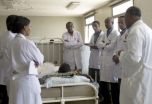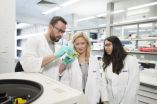(Press-News.org) Health care systems that keep HIV patients from dying early in low- and middle-income nations need urgently to be repurposed to treat the chronic diseases that many of these patients now have, experts say.
According to recommendations resulting from a multidisciplinary conference sponsored by the National Institutes of Health, scientists and physicians in low- and middle-income countries should build on existing HIV research to study and treat chronic conditions. Patients once condemned to death by AIDS now suffer from noncommunicable diseases such as tuberculosis, cancer, heart and lung disease, kidney disease, diabetes, mental illness and gastrointestinal disorders. These conditions can be related to the infection itself, the drugs used to treat it, or the simple process of aging.
Increasing rates of chronic diseases among persons with HIV, if unaddressed may set back or even reverse the impressive health gains achieved over the last decade, according to the authors of a new series of articles. Additionally, clinics in many rural areas of Africa, Asia and Latin America are increasingly under strain as they attempt to provide services beyond acute care to treat long-term HIV. To address these issues, global health experts recommend increasing research capacity with respect to HIV-noncommunicable disease burdens in developing countries.
An international group of researchers detailed the problem in a special issue of the Journal of Acquired Immune Deficiency Syndromes. In eight articles and two commentaries, the scientists lay out a research agenda to determine the scope of the noncommunicable disease problems and study the most efficient and cost-effective ways to tackle them. Estimates indicate that chronic illnesses have already overtaken infectious diseases as the main killers in the developing world, the authors report. These conditions can be simultaneous chronic diseases associated with HIV-related illness, whether HIV is being treated or not.
Research will play a critical role in providing the evidence, strategies and tools required to address this complex challenge, said the authors, who called for visionary scientific leadership, sustained investment and attention, and the breakdown of disciplinary silos.
"Just as the advent of widespread antiretroviral treatment demanded a seismic shift in global human capacity and health systems for the emergency response to HIV, emerging chronic conditions among those with HIV in lower- and middle-income countries will demand no less," said K. M. Venkat Narayan, M.D., of Emory University, Atlanta, one of the supplement's lead authors.
While the bulk of the supplement concerned circumstances in sub-Saharan Africa, two essays described similar challenges in low-resource settings in Asia, and in Latin America and the Caribbean. The authors suggested a number of complex health and implementation science topics in developing countries that merit further study, including:
The lessons learned from the integration of tuberculosis care into HIV treatment should be examined to develop optimal strategies to combat chronic diseases. .
Drug delivery systems now devoted to antiretroviral therapy (ART) and tuberculosis medicines could add essential and affordable drugs for noncommunicable disease management, improving the long-term survival and quality of life of those living with HIV, while potentially increasing ART adherence.
Virally triggered cancers associated with weakened immune systems are common—among them anal cancer, liver cancer and Hodgkin disease—but the epidemiology of HIV-associated cancers is not well studied.
ART is known to increase the risk of heart failure and other cardiopulmonary conditions in high-income countries but little is known about the impact in low-resource settings, where individuals may face additional risk factors such as air pollution.
Depression, alcohol abuse and nervous system disorders affecting memory, attention, decision-making and problem-solving are prevalent in people living with HIV but the diagnostic tools in low- and middle-income countries are inadequate.
Kidney disease— whether caused by HIV-related infections or toxins from antiretroviral treatments – is on the rise, and registries should be established to study occurrence and severity of side effects to ART.
There was also consensus that enhancement of HIV research and care platforms—as well as expanded training for researchers and providers— could strengthen health systems and improve the overall care of persons living with HIV/AIDS and larger populations.
"The papers in this supplement articulate an agenda from which we can begin to address the spectrum of research, training, effective implementation and evidence-based policy needed to confront this devastating new challenge of chronic illness among those living with HIV in developing countries," according. Roger I. Glass, director of NIH's Fogarty International Center, which supports international research.
The publication grew out of a 2013 conference of international experts held at the Center for Global Health Studies at the National Institutes of Health, jointly chaired by Dr. Sten Vermund of Vanderbilt University School of Medicine, Nashville, and Dr. K. M. Venkat Narayan of Emory University's Rollins School of Public Health. Attendees included representatives of nine NIH Institutes and Centers, as well as the World Health Organization, the U.S. Agency for International Development, the Centers for Disease Control and Prevention, the World Bank and the Office of the Global AIDS Coordinator at the U.S. Department of State. The meeting was hosted by the NIH Office of AIDS Research and the Fogarty International Center.
INFORMATION:
The open access publication is available at http://journals.lww.com/jaids/toc/2014/09011
Scientists detail urgent research agenda to address chronic disease toll
HIV patients in developing countries facing new health risks must be a high priority, say experts
2014-08-14
ELSE PRESS RELEASES FROM THIS DATE:
Study of Chilean quake shows potential for future earthquake
2014-08-14
Near real-time analysis of the April 1 earthquake in Iquique, Chile, showed that the 8.2 event occurred in a gap on the fault unruptured since 1877 and that the April event was not what the scientists had expected, according to an international team of geologists.
"We assumed that the area of the 1877 earthquake would eventually rupture, but all indications are that this 8.2 event was not the 8.8 event we were looking for," said Kevin P. Furlong, professor of geophysics, Penn State. "We looked at it to see if this was the big one."
But according to the researchers, ...
People fake to look authentic on social media
2014-08-14
Presenting an authentic image on social network sites (SNSs) includes an element of fakery according to a new study by researchers at Aalto University. During the study, researchers discovered that being authentic is very important for social media users. At the same time, users also admitted faking parts of their online image in order to conform to social norms and expectations.
By focusing on two SNSs, Facebook and Last.fm, the researchers came to the conclusion that being real is much more acceptable according to social norms.
Although both of these SNSs differ ...
Fukushima's legacy
2014-08-14
Following the 1986 Chernobyl nuclear power plant meltdown, biological samples were obtained only after extensive delays, limiting the information that could be gained about the impacts of that historic disaster. Determined not to repeat the shortcomings of the Chernobyl studies, scientists began gathering biological information only a few months after the disastrous meltdown of the Fukushima Daiichi power plant in Japan in 2011. Results of these studies are now beginning to reveal serious biological effects of the Fukushima radiation on non-human organisms ranging from ...
Immune cell discovery could help to halt cancer spread
2014-08-14
Melbourne researchers have revealed the critical importance of highly specialised immune cells, called natural killer cells, in killing melanoma cells that have spread to the lungs.
These natural killer cells could be harnessed to hunt down and kill cancers that have spread in the body.
The team, from the Walter and Eliza Hall Institute, also found natural killer cells were critical to the body's rejection of donor bone marrow transplants and in the runaway immune response during toxic shock syndrome.
The discoveries came after the team showed that a protein called ...
Newborns' genetic code sends infection distress signal
2014-08-14
Babies suffering from life-threatening bacterial infections such as sepsis could benefit from improved treatment, thanks to a ground-breaking study.
For the first time, researchers have been able to detect and decode a signal generated from a baby's DNA that can tell doctors whether or not a bacterial infection is present in the bloodstream.
The findings could help develop a test for bacterial infection in newborns, using a single drop of blood.
Immediate detection of such infections, which are a major cause of death among young children, is currently impossible ...
Bypass commands from the brain to legs through a computer
2014-08-14
VIDEO:
The right arm muscles and the locomotion center of the man are artificially connected through a computer. His legs are in a relaxed state. When he moves his right hand,...
Click here for more information.
Gait disturbance in individuals with spinal cord injury is attributed to the interruption of neural pathways from brain to the spinal locomotor center, whereas neural circuits locate below and above the lesion maintain most of their functions. An artificial connection ...
Aspirin may slow recurrence in breast cancer patients
2014-08-14
SAN ANTONIO (August 14, 2014) — New findings published today in the journal Cancer Research reveal that some postmenopausal overweight breast cancer patients who use common anti-inflammatory drugs like aspirin or ibuprofen have significantly lower breast cancer recurrence rates.
Researchers from the Cancer Therapy & Research Center at The University of Texas Health Science Center at San Antonio and the University of Texas at Austin began by examining blood serum from CTRC breast cancer patients, said CTRC oncologist Andrew Brenner, M.D., Ph.D.
Studying Blood Serum
They ...
Protein found to block benefits of vitamin A cancer therapy
2014-08-14
Retinoic acid is a form of vitamin A that is used to treat and help prevent the recurrence of a variety of cancers, but for some patients the drug is not effective. The reason for this resistance was unclear until this week when researchers from Virginia Commonwealth University (VCU) Massey Cancer Center demonstrated that a protein known as AEG-1 blocks the effects of retinoic acid in leukemia and liver cancer. Because AEG-1 is overexpressed in nearly every cancer, these findings could impact the care of countless cancer patients.
Details of the study were published ...
Lionfish characteristics make them more 'terminator' than predator
2014-08-14
SACRAMENTO, Calif. – New research on the predatory nature of red lionfish, the invasive Pacific Ocean species that is decimating native fish populations in parts of the Caribbean Sea and Atlantic Ocean, seems to indicate that lionfish are not just a predator, but more like the "terminator" of movie fame.
The finding of behavior that was called "alarming" was presented today by Kurt Ingeman, a researcher from Oregon State University, at the annual meeting of the Ecological Society of America.
Most native predatory fish are attracted to prey when their numbers are high, ...
NSAIDs may lower breast cancer recurrence rate in overweight and obese women
2014-08-14
PHILADELPHIA — Recurrence of hormone-related breast cancer was cut by half in overweight and obese women who regularly used aspirin or other nonsteroidal anti-inflammatory drugs (NSAIDs), according to data published in Cancer Research, a journal of the American Association for Cancer Research.
"Our studies suggest that limiting inflammatory signaling may be an effective, less toxic approach to altering the cancer-promoting effects of obesity and improving patient response to hormone therapy," said Linda A. deGraffenried, PhD, associate professor of nutritional sciences ...
LAST 30 PRESS RELEASES:
Scientists deliver new molecule for getting DNA into cells
Study reveals insights about brain regions linked to OCD, informing potential treatments
Does ocean saltiness influence El Niño?
2026 Young Investigators: ONR celebrates new talent tackling warfighter challenges
Genetics help explain who gets the ‘telltale tingle’ from music, art and literature
Many Americans misunderstand medical aid in dying laws
Researchers publish landmark infectious disease study in ‘Science’
New NSF award supports innovative role-playing game approach to strengthening research security in academia
Kumar named to ACMA Emerging Leaders Program for 2026
AI language models could transform aquatic environmental risk assessment
New isotope tools reveal hidden pathways reshaping the global nitrogen cycle
Study reveals how antibiotic structure controls removal from water using biochar
Why chronic pain lasts longer in women: Immune cells offer clues
Toxic exposure creates epigenetic disease risk over 20 generations
More time spent on social media linked to steroid use intentions among boys and men
New study suggests a “kick it while it’s down” approach to cancer treatment could improve cure rates
Milken Institute, Ann Theodore Foundation launch new grant to support clinical trial for potential sarcoidosis treatment
New strategies boost effectiveness of CAR-NK therapy against cancer
Study: Adolescent cannabis use linked to doubling risk of psychotic and bipolar disorders
Invisible harms: drug-related deaths spike after hurricanes and tropical storms
Adolescent cannabis use and risk of psychotic, bipolar, depressive, and anxiety disorders
Anxiety, depression, and care barriers in adults with intellectual and developmental disabilities
Study: Anxiety, gloom often accompany intellectual deficits
Massage Therapy Foundation awards $300,000 research grant to the University of Denver
Gastrointestinal toxicity linked to targeted cancer therapies in the United States
Countdown to the Bial Award in Biomedicine 2025
Blood marker from dementia research could help track aging across the animal world
Birds change altitude to survive epic journeys across deserts and seas
Here's why you need a backup for the map on your phone
ACS Central Science | Researchers from Insilico Medicine and Lilly publish foundational vision for fully autonomous “Prompt-to-Drug” pharmaceutical R&D
[Press-News.org] Scientists detail urgent research agenda to address chronic disease tollHIV patients in developing countries facing new health risks must be a high priority, say experts






